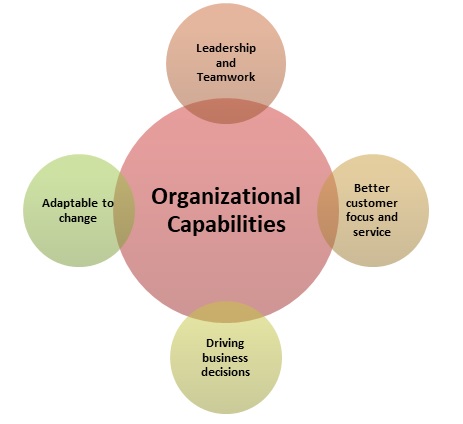- Business Concepts ›
- Human Resources (HR) ›
- Organizational Capabilities
Organizational Capabilities
Definition, Importance & Example
This article covers meaning & overview of Organizational Capabilities from HRM perspective.
What is meant by Organizational Capabilities?
Organizational capabilities are something that people, organization and technology together brings into plate while working together to drive business results. Organizational capabilities include collaboration, talent management which binds all the part of the business together. Organizational capability-based strategy focuses on planning, designing and delivering business capabilities to the firm.
The firms show four types of organizational capabilities such as
a) Essential capabilities
b) Business necessity capabilities
c) Strategic support capabilities
d) Advantage capabilities.
Capability management deals with the establishing goals based on value. These organizational capabilities help organization to become adaptable to the speed of change, to make collaboration across boundaries, to learn and to establish a very good company’s culture, visibility of the firm. The execution of these processes requires better coordination across business verticals. Capability based planning is helpful in coordinating IT with business and helps in continuous business value creation.

Importance of Organizational Capabilities
Organizational capabilities are of utmost important for both the organization as well as the individual to deliver best business results. For a company, resources and capabilities are important. The process of building strategies out of their capabilities into action is the quality of a business leadership. The capabilities like skills, attitude, behavior helps in gaining competitive advantage against its competitors and in turn helps in increasing the value of a firm. Strategic capabilities focus on the firm’s assets and its market position and determine how the firm can be able to employ strategies in future. Organizational capabilities are known as intangible assets which include financial services, solution, software development skills, people engagement, process excellence which an organization can leverage upon while building its business strategy. Nowadays organizations are very much concerned with the re-skilling their employees to sustain competitive advantage which is treated as a resource which is valuable, non-substitutable and rare. Organizational capabilities always focus on providing service and satisfaction to its customers. It is important for an organization to choose and decide the most impactful capabilities and its feasibility to implement it. It is important to monitor the quality training received by the top leaders of the company to develop required organizational capabilities which are needed to make business decisions.
Read More
Difference Between Organizational Capabilities and Competency
Most of the time, competency and capability are used interchangeably but these two have differences. Competencies are used to describe about individuals whereas capabilities are used in the context of organization. Organizational capabilities refers to the ability to collaborate, managing talent and accountability whereas individual competencies includes the skill sets, analytical ability, behavior and attitude that they posses.
Example of Organizational Capabilities
Business capabilities can be seen in banking sector where a bank is responsible for managing risks; its credit department is responsible for credit risks. It can also be seen in IT department where its role is to manage Information security. For a FMCG company, organizational capabilities are needed in order to set prices for the products, when the company launches and develop some new innovative product, in providing customer service. In aircraft industry, the customer queries and claims are handled by the airline operation department. Similarly, the meal services are being provided by the crew members to the customers.
Hence, this concludes the definition of Organizational Capabilities along with its overview.
This article has been researched & authored by the Business Concepts Team which comprises of MBA students, management professionals, and industry experts. It has been reviewed & published by the MBA Skool Team. The content on MBA Skool has been created for educational & academic purpose only.
Browse the definition and meaning of more similar terms. The Management Dictionary covers over 1800 business concepts from 5 categories.
Continue Reading:
What is MBA Skool?About Us
MBA Skool is a Knowledge Resource for Management Students, Aspirants & Professionals.
Business Courses
Quizzes & Skills
Quizzes test your expertise in business and Skill tests evaluate your management traits
Related Content
All Business Sections
Write for Us